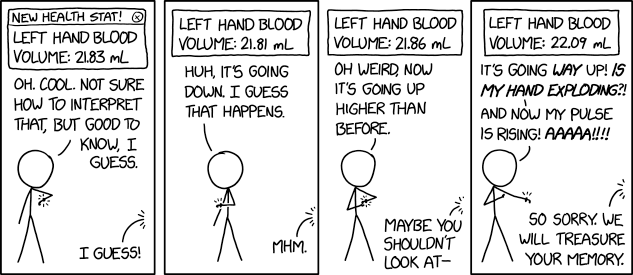Tracking Health #

Why? #
A common (the most common?) way people try to stay healthy is by adopting habits that are generally known to be healthy. By “generally known”, I mean that epidemiological studies have found correlations between certain behaviors and positive outcomes, or that anecdotes from individual people support a behavior (“this worked for me”). This is a great starting point for determining what is healthy, but it is not perfect. Unfortunately, there is a great deal of variation between different people in what is physically healthy for them, and both studies and anecdotes can be systematically flawed.
Probably the most reliable way to stay vigorous and healthy for the longest possible time is by self-experimenting to see what behaviors work best for you. Of course, using anecdotes/epidemiology/randomized controlled trials to inform what to try will greatly accelerate your ability to settle on the best habits.
Inputs #
These are things you can change or habits you can adapt to effect your health. Tracking them is useful to correlate them with outputs.
Food #
See “Tracking Food”
Exercise #
Methods #
- Fitbit
- Oura Ring
- Location Tracking
Blood Pressure #
Sleep Time #
Dental Care #
Socializing #
Use a microphone to detect how much I personally am talking, use this as a proxy for how social I am being.
Temperature #
Both body temperature and external ambient temperature/humidity.
Outputs #
These are metrics that correlate in some way with health goals (e.g. staying vigorous and health for the longest possible time).
Epigenetic Clocks #
Sleep Quality #
Continuous Glucose Monitoring #
Resting Heart Rate #
Notes for how to accomplish:
Correlates with healthspan (citation needed).
Heart Rate Variability #
Correlates with healthspan (citation needed).
Cortisol Levels #
Can be measured in sweat apparently. No commercial products as of 11/2021.
Omega-3 Index #
https://omegaquant.com/omega-3-index-basic/
Correlates with healthspan (citation needed).
Biological Age Via Blood Testing #
See Michael Lustgarten’s site for details.
I created a spreadsheet for myself based off of Lustgarten’s with a custom Google Sheets function to calculate biological age at https://docs.google.com/spreadsheets/d/1ZhbaKATK2hERSFHq21pJ1fqn-EVKtMqIU1iv2Z01_EY/edit?usp=sharing.
Weight #
Correlates with healthspan (citation needed).
Waist Circumference #
Correlates with healthspan (citation needed).
Body composition #
Use smart scale or more sophisticated techniques.
Correlates with healthspan (citation needed).
Digestion Progress #
Random Idea: Use body’s center of mass to estimate digestion progress/state. Presumably right after eating mass is centered in the stomach, then slowly diffuses to other parts of the body.
Could also use waist circumference.
Tracking Farts/Burps/Poops #
Would use Momentodb for this.
Might correlate with gut health somehow, which might correlate to longer healthspan?
Mood and Mental State #
- Mood tracking via heart data: https://upmood.com/